The UK Sugar Tax: Economic Policies and Business Strategies
VerifiedAdded on 2021/02/22
|7
|2472
|102
Case Study
AI Summary
This case study analyzes the UK sugar tax introduced in 2016 to reduce childhood obesity by decreasing sugar content in soft drinks. It explores market imperfections and failures associated with sugar consumption, such as lack of information and negative externalities, which led to the tax implementation. The study examines the tax's impact on business strategies and management decisions, including changes in product recipes, pricing, and marketing. It also discusses the limitations and consequences of the sugar tax, such as its effect on low-income groups and the potential for inelastic demand. The analysis considers the impact on entrepreneurship, labor, and financial products, emphasizing the need for strategic adjustments to maintain competitiveness and profitability. Overall, the case study highlights the complex interplay between government policies, economic factors, and business responses in the context of public health initiatives.
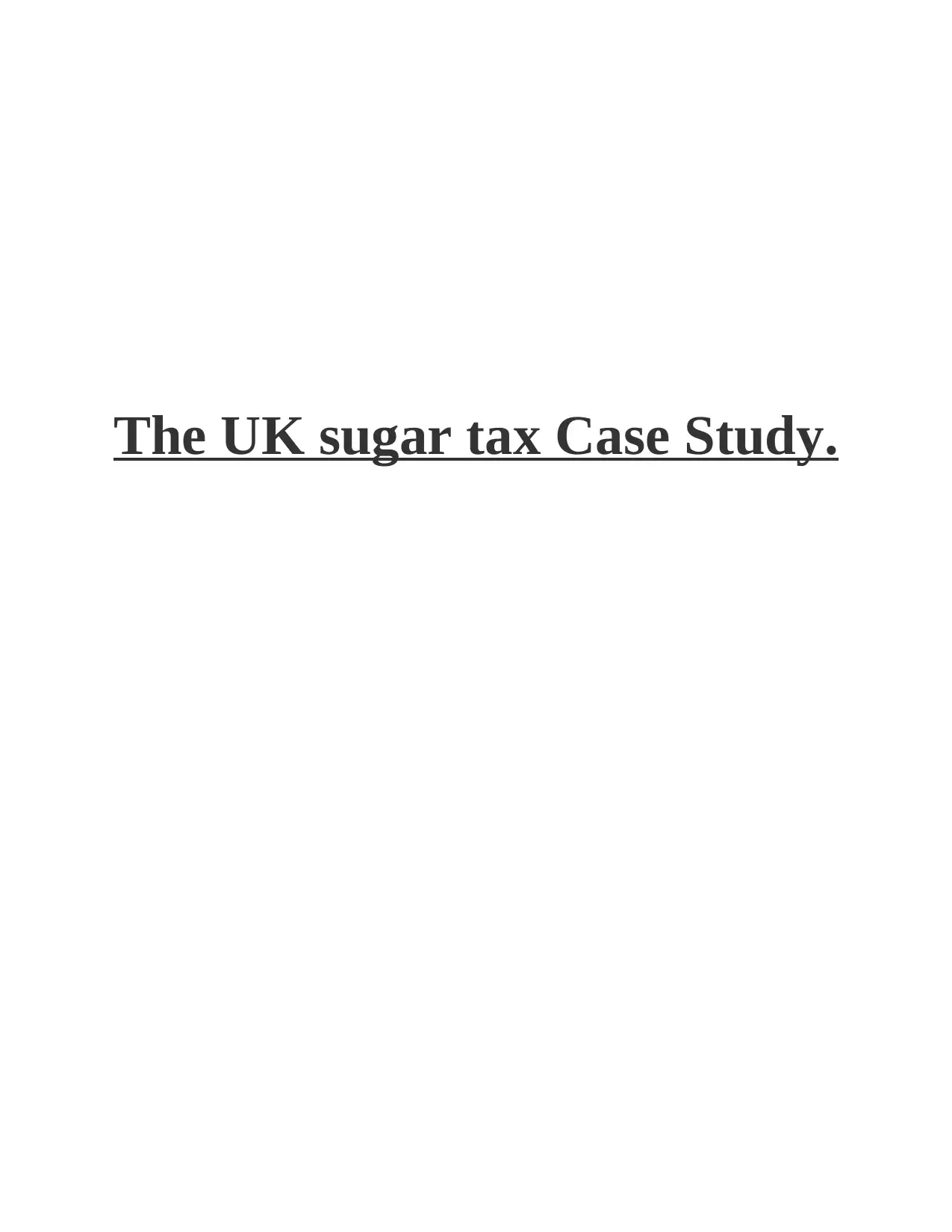
The UK sugar tax Case Study.
Paraphrase This Document
Need a fresh take? Get an instant paraphrase of this document with our AI Paraphraser
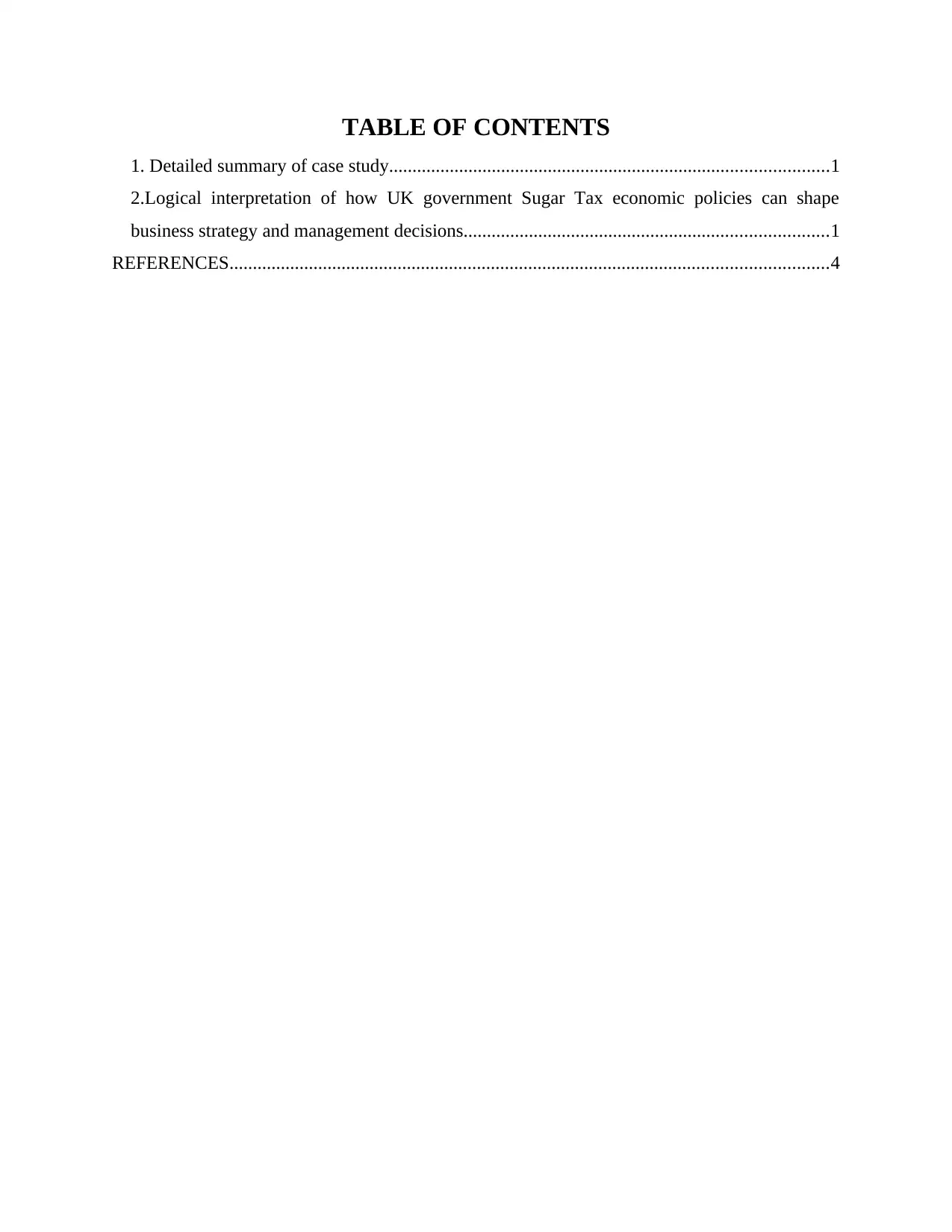
TABLE OF CONTENTS
1. Detailed summary of case study..............................................................................................1
2.Logical interpretation of how UK government Sugar Tax economic policies can shape
business strategy and management decisions..............................................................................1
REFERENCES................................................................................................................................4
1. Detailed summary of case study..............................................................................................1
2.Logical interpretation of how UK government Sugar Tax economic policies can shape
business strategy and management decisions..............................................................................1
REFERENCES................................................................................................................................4
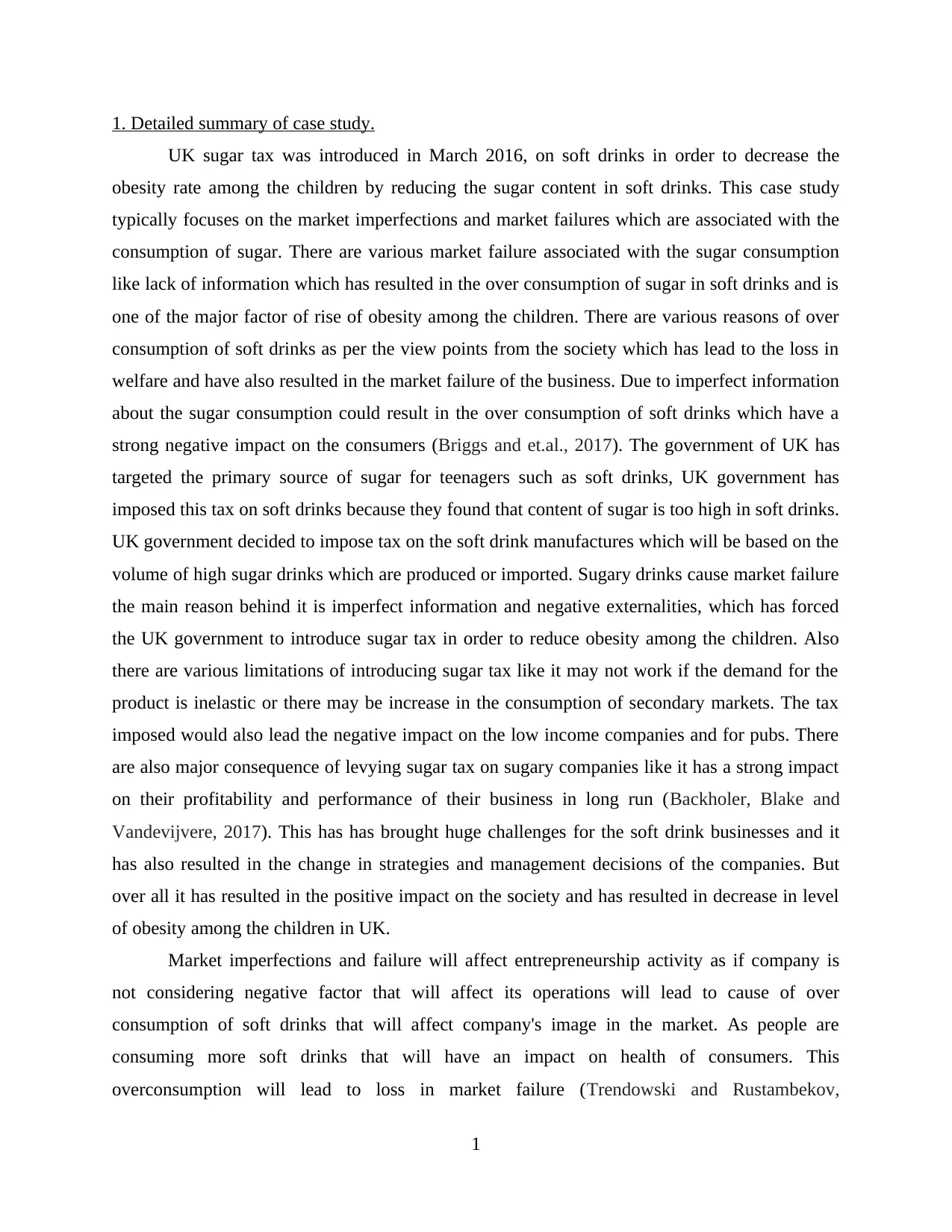
1. Detailed summary of case study.
UK sugar tax was introduced in March 2016, on soft drinks in order to decrease the
obesity rate among the children by reducing the sugar content in soft drinks. This case study
typically focuses on the market imperfections and market failures which are associated with the
consumption of sugar. There are various market failure associated with the sugar consumption
like lack of information which has resulted in the over consumption of sugar in soft drinks and is
one of the major factor of rise of obesity among the children. There are various reasons of over
consumption of soft drinks as per the view points from the society which has lead to the loss in
welfare and have also resulted in the market failure of the business. Due to imperfect information
about the sugar consumption could result in the over consumption of soft drinks which have a
strong negative impact on the consumers (Briggs and et.al., 2017). The government of UK has
targeted the primary source of sugar for teenagers such as soft drinks, UK government has
imposed this tax on soft drinks because they found that content of sugar is too high in soft drinks.
UK government decided to impose tax on the soft drink manufactures which will be based on the
volume of high sugar drinks which are produced or imported. Sugary drinks cause market failure
the main reason behind it is imperfect information and negative externalities, which has forced
the UK government to introduce sugar tax in order to reduce obesity among the children. Also
there are various limitations of introducing sugar tax like it may not work if the demand for the
product is inelastic or there may be increase in the consumption of secondary markets. The tax
imposed would also lead the negative impact on the low income companies and for pubs. There
are also major consequence of levying sugar tax on sugary companies like it has a strong impact
on their profitability and performance of their business in long run (Backholer, Blake and
Vandevijvere, 2017). This has has brought huge challenges for the soft drink businesses and it
has also resulted in the change in strategies and management decisions of the companies. But
over all it has resulted in the positive impact on the society and has resulted in decrease in level
of obesity among the children in UK.
Market imperfections and failure will affect entrepreneurship activity as if company is
not considering negative factor that will affect its operations will lead to cause of over
consumption of soft drinks that will affect company's image in the market. As people are
consuming more soft drinks that will have an impact on health of consumers. This
overconsumption will lead to loss in market failure (Trendowski and Rustambekov,
1
UK sugar tax was introduced in March 2016, on soft drinks in order to decrease the
obesity rate among the children by reducing the sugar content in soft drinks. This case study
typically focuses on the market imperfections and market failures which are associated with the
consumption of sugar. There are various market failure associated with the sugar consumption
like lack of information which has resulted in the over consumption of sugar in soft drinks and is
one of the major factor of rise of obesity among the children. There are various reasons of over
consumption of soft drinks as per the view points from the society which has lead to the loss in
welfare and have also resulted in the market failure of the business. Due to imperfect information
about the sugar consumption could result in the over consumption of soft drinks which have a
strong negative impact on the consumers (Briggs and et.al., 2017). The government of UK has
targeted the primary source of sugar for teenagers such as soft drinks, UK government has
imposed this tax on soft drinks because they found that content of sugar is too high in soft drinks.
UK government decided to impose tax on the soft drink manufactures which will be based on the
volume of high sugar drinks which are produced or imported. Sugary drinks cause market failure
the main reason behind it is imperfect information and negative externalities, which has forced
the UK government to introduce sugar tax in order to reduce obesity among the children. Also
there are various limitations of introducing sugar tax like it may not work if the demand for the
product is inelastic or there may be increase in the consumption of secondary markets. The tax
imposed would also lead the negative impact on the low income companies and for pubs. There
are also major consequence of levying sugar tax on sugary companies like it has a strong impact
on their profitability and performance of their business in long run (Backholer, Blake and
Vandevijvere, 2017). This has has brought huge challenges for the soft drink businesses and it
has also resulted in the change in strategies and management decisions of the companies. But
over all it has resulted in the positive impact on the society and has resulted in decrease in level
of obesity among the children in UK.
Market imperfections and failure will affect entrepreneurship activity as if company is
not considering negative factor that will affect its operations will lead to cause of over
consumption of soft drinks that will affect company's image in the market. As people are
consuming more soft drinks that will have an impact on health of consumers. This
overconsumption will lead to loss in market failure (Trendowski and Rustambekov,
1
⊘ This is a preview!⊘
Do you want full access?
Subscribe today to unlock all pages.

Trusted by 1+ million students worldwide
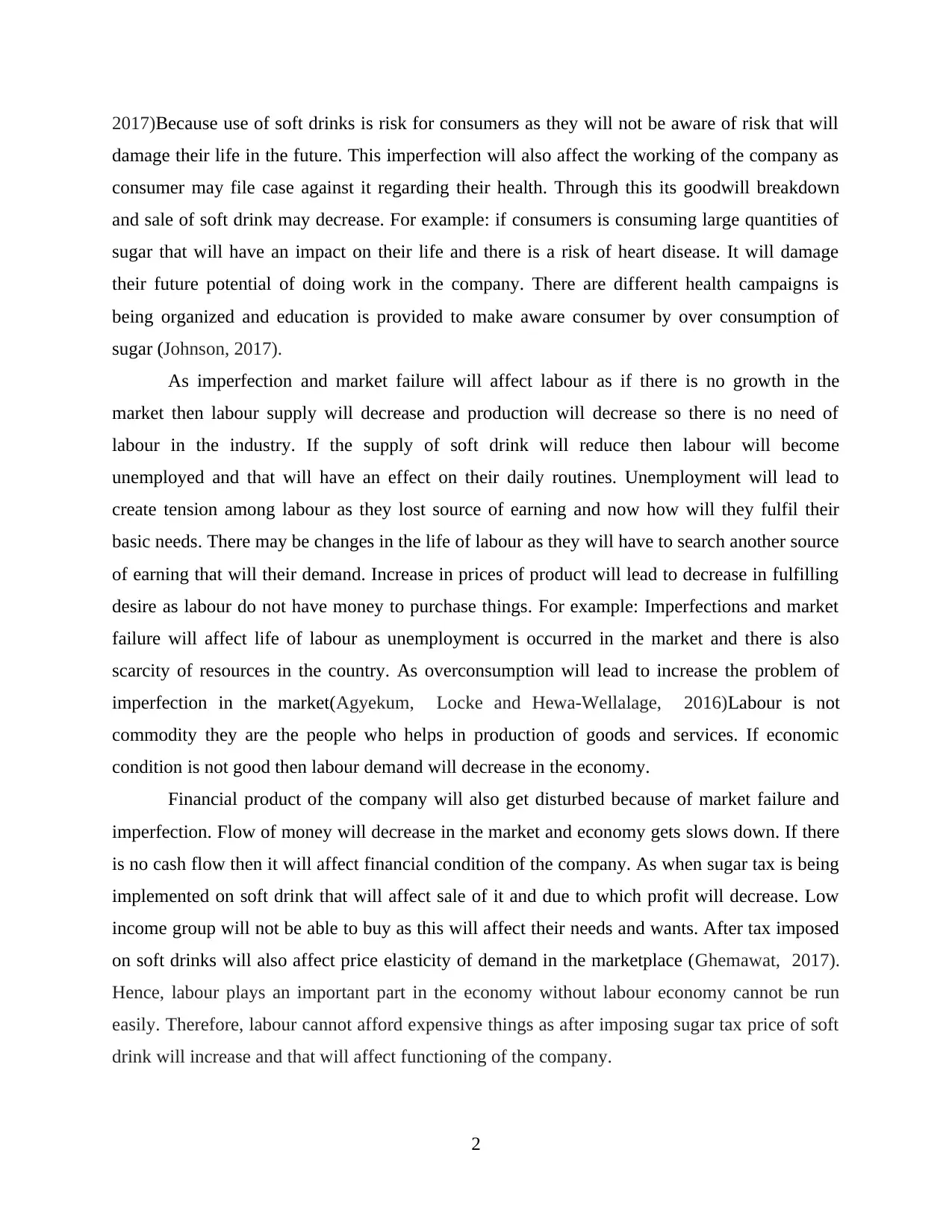
2017)Because use of soft drinks is risk for consumers as they will not be aware of risk that will
damage their life in the future. This imperfection will also affect the working of the company as
consumer may file case against it regarding their health. Through this its goodwill breakdown
and sale of soft drink may decrease. For example: if consumers is consuming large quantities of
sugar that will have an impact on their life and there is a risk of heart disease. It will damage
their future potential of doing work in the company. There are different health campaigns is
being organized and education is provided to make aware consumer by over consumption of
sugar (Johnson, 2017).
As imperfection and market failure will affect labour as if there is no growth in the
market then labour supply will decrease and production will decrease so there is no need of
labour in the industry. If the supply of soft drink will reduce then labour will become
unemployed and that will have an effect on their daily routines. Unemployment will lead to
create tension among labour as they lost source of earning and now how will they fulfil their
basic needs. There may be changes in the life of labour as they will have to search another source
of earning that will their demand. Increase in prices of product will lead to decrease in fulfilling
desire as labour do not have money to purchase things. For example: Imperfections and market
failure will affect life of labour as unemployment is occurred in the market and there is also
scarcity of resources in the country. As overconsumption will lead to increase the problem of
imperfection in the market(Agyekum, Locke and Hewa-Wellalage, 2016)Labour is not
commodity they are the people who helps in production of goods and services. If economic
condition is not good then labour demand will decrease in the economy.
Financial product of the company will also get disturbed because of market failure and
imperfection. Flow of money will decrease in the market and economy gets slows down. If there
is no cash flow then it will affect financial condition of the company. As when sugar tax is being
implemented on soft drink that will affect sale of it and due to which profit will decrease. Low
income group will not be able to buy as this will affect their needs and wants. After tax imposed
on soft drinks will also affect price elasticity of demand in the marketplace (Ghemawat, 2017).
Hence, labour plays an important part in the economy without labour economy cannot be run
easily. Therefore, labour cannot afford expensive things as after imposing sugar tax price of soft
drink will increase and that will affect functioning of the company.
2
damage their life in the future. This imperfection will also affect the working of the company as
consumer may file case against it regarding their health. Through this its goodwill breakdown
and sale of soft drink may decrease. For example: if consumers is consuming large quantities of
sugar that will have an impact on their life and there is a risk of heart disease. It will damage
their future potential of doing work in the company. There are different health campaigns is
being organized and education is provided to make aware consumer by over consumption of
sugar (Johnson, 2017).
As imperfection and market failure will affect labour as if there is no growth in the
market then labour supply will decrease and production will decrease so there is no need of
labour in the industry. If the supply of soft drink will reduce then labour will become
unemployed and that will have an effect on their daily routines. Unemployment will lead to
create tension among labour as they lost source of earning and now how will they fulfil their
basic needs. There may be changes in the life of labour as they will have to search another source
of earning that will their demand. Increase in prices of product will lead to decrease in fulfilling
desire as labour do not have money to purchase things. For example: Imperfections and market
failure will affect life of labour as unemployment is occurred in the market and there is also
scarcity of resources in the country. As overconsumption will lead to increase the problem of
imperfection in the market(Agyekum, Locke and Hewa-Wellalage, 2016)Labour is not
commodity they are the people who helps in production of goods and services. If economic
condition is not good then labour demand will decrease in the economy.
Financial product of the company will also get disturbed because of market failure and
imperfection. Flow of money will decrease in the market and economy gets slows down. If there
is no cash flow then it will affect financial condition of the company. As when sugar tax is being
implemented on soft drink that will affect sale of it and due to which profit will decrease. Low
income group will not be able to buy as this will affect their needs and wants. After tax imposed
on soft drinks will also affect price elasticity of demand in the marketplace (Ghemawat, 2017).
Hence, labour plays an important part in the economy without labour economy cannot be run
easily. Therefore, labour cannot afford expensive things as after imposing sugar tax price of soft
drink will increase and that will affect functioning of the company.
2
Paraphrase This Document
Need a fresh take? Get an instant paraphrase of this document with our AI Paraphraser
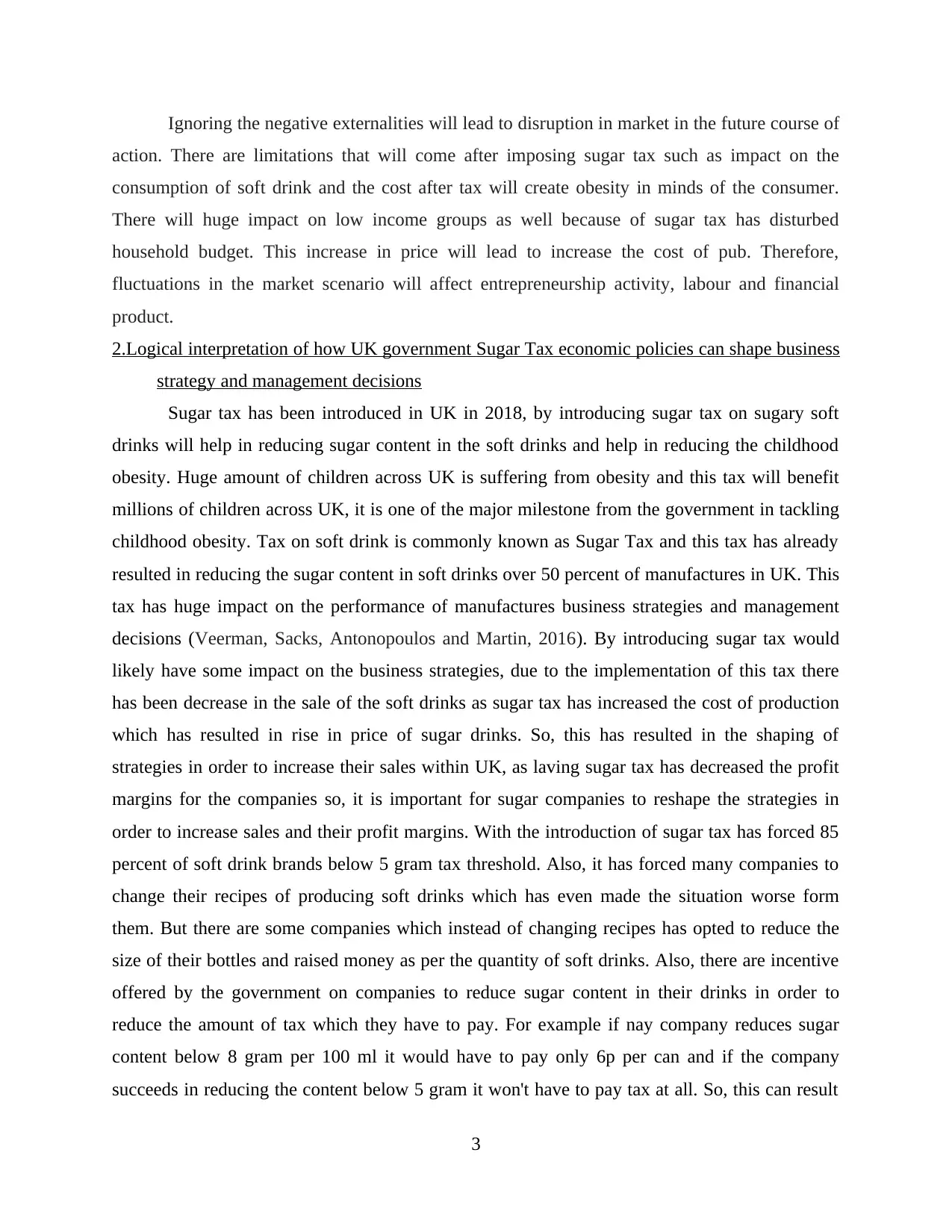
Ignoring the negative externalities will lead to disruption in market in the future course of
action. There are limitations that will come after imposing sugar tax such as impact on the
consumption of soft drink and the cost after tax will create obesity in minds of the consumer.
There will huge impact on low income groups as well because of sugar tax has disturbed
household budget. This increase in price will lead to increase the cost of pub. Therefore,
fluctuations in the market scenario will affect entrepreneurship activity, labour and financial
product.
2.Logical interpretation of how UK government Sugar Tax economic policies can shape business
strategy and management decisions
Sugar tax has been introduced in UK in 2018, by introducing sugar tax on sugary soft
drinks will help in reducing sugar content in the soft drinks and help in reducing the childhood
obesity. Huge amount of children across UK is suffering from obesity and this tax will benefit
millions of children across UK, it is one of the major milestone from the government in tackling
childhood obesity. Tax on soft drink is commonly known as Sugar Tax and this tax has already
resulted in reducing the sugar content in soft drinks over 50 percent of manufactures in UK. This
tax has huge impact on the performance of manufactures business strategies and management
decisions (Veerman, Sacks, Antonopoulos and Martin, 2016). By introducing sugar tax would
likely have some impact on the business strategies, due to the implementation of this tax there
has been decrease in the sale of the soft drinks as sugar tax has increased the cost of production
which has resulted in rise in price of sugar drinks. So, this has resulted in the shaping of
strategies in order to increase their sales within UK, as laving sugar tax has decreased the profit
margins for the companies so, it is important for sugar companies to reshape the strategies in
order to increase sales and their profit margins. With the introduction of sugar tax has forced 85
percent of soft drink brands below 5 gram tax threshold. Also, it has forced many companies to
change their recipes of producing soft drinks which has even made the situation worse form
them. But there are some companies which instead of changing recipes has opted to reduce the
size of their bottles and raised money as per the quantity of soft drinks. Also, there are incentive
offered by the government on companies to reduce sugar content in their drinks in order to
reduce the amount of tax which they have to pay. For example if nay company reduces sugar
content below 8 gram per 100 ml it would have to pay only 6p per can and if the company
succeeds in reducing the content below 5 gram it won't have to pay tax at all. So, this can result
3
action. There are limitations that will come after imposing sugar tax such as impact on the
consumption of soft drink and the cost after tax will create obesity in minds of the consumer.
There will huge impact on low income groups as well because of sugar tax has disturbed
household budget. This increase in price will lead to increase the cost of pub. Therefore,
fluctuations in the market scenario will affect entrepreneurship activity, labour and financial
product.
2.Logical interpretation of how UK government Sugar Tax economic policies can shape business
strategy and management decisions
Sugar tax has been introduced in UK in 2018, by introducing sugar tax on sugary soft
drinks will help in reducing sugar content in the soft drinks and help in reducing the childhood
obesity. Huge amount of children across UK is suffering from obesity and this tax will benefit
millions of children across UK, it is one of the major milestone from the government in tackling
childhood obesity. Tax on soft drink is commonly known as Sugar Tax and this tax has already
resulted in reducing the sugar content in soft drinks over 50 percent of manufactures in UK. This
tax has huge impact on the performance of manufactures business strategies and management
decisions (Veerman, Sacks, Antonopoulos and Martin, 2016). By introducing sugar tax would
likely have some impact on the business strategies, due to the implementation of this tax there
has been decrease in the sale of the soft drinks as sugar tax has increased the cost of production
which has resulted in rise in price of sugar drinks. So, this has resulted in the shaping of
strategies in order to increase their sales within UK, as laving sugar tax has decreased the profit
margins for the companies so, it is important for sugar companies to reshape the strategies in
order to increase sales and their profit margins. With the introduction of sugar tax has forced 85
percent of soft drink brands below 5 gram tax threshold. Also, it has forced many companies to
change their recipes of producing soft drinks which has even made the situation worse form
them. But there are some companies which instead of changing recipes has opted to reduce the
size of their bottles and raised money as per the quantity of soft drinks. Also, there are incentive
offered by the government on companies to reduce sugar content in their drinks in order to
reduce the amount of tax which they have to pay. For example if nay company reduces sugar
content below 8 gram per 100 ml it would have to pay only 6p per can and if the company
succeeds in reducing the content below 5 gram it won't have to pay tax at all. So, this can result
3
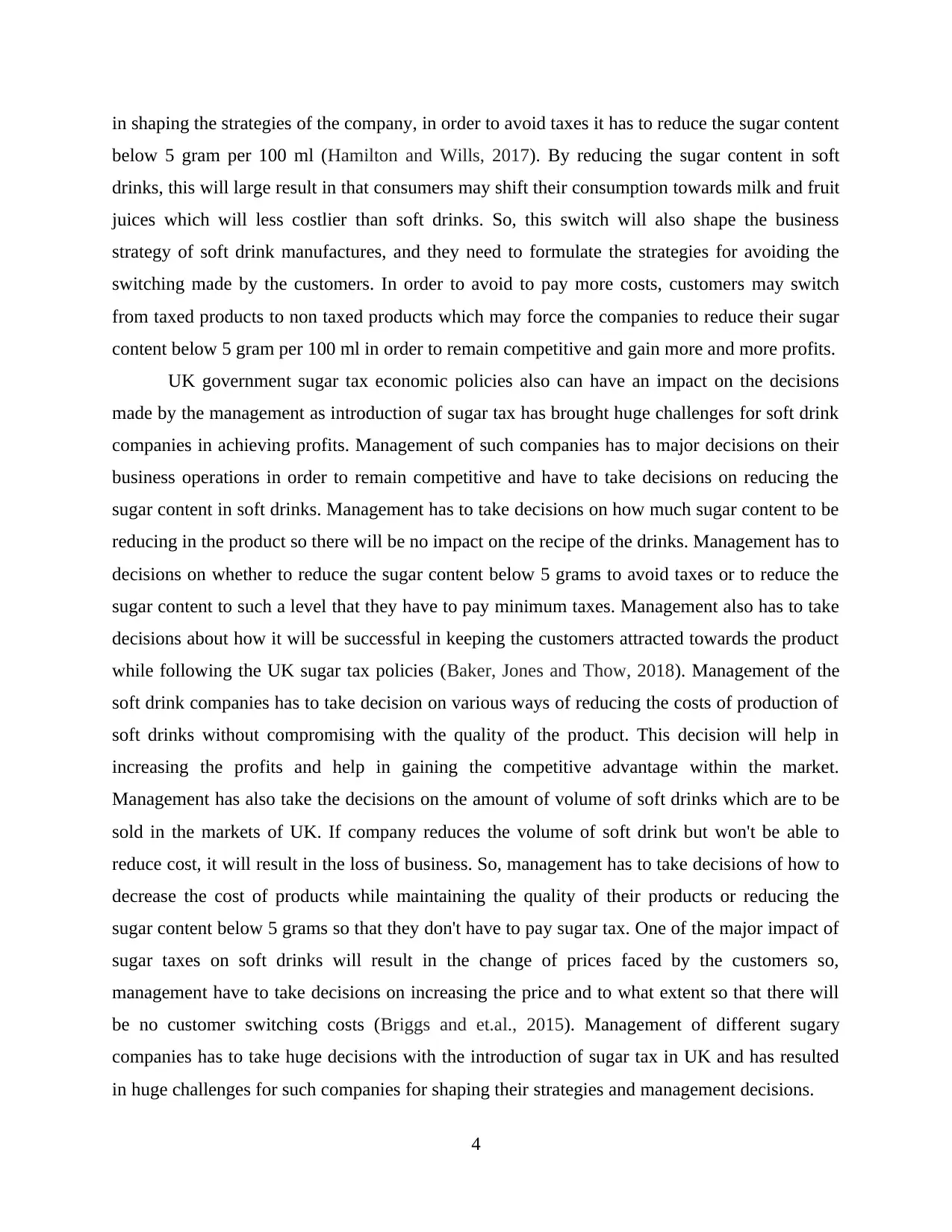
in shaping the strategies of the company, in order to avoid taxes it has to reduce the sugar content
below 5 gram per 100 ml (Hamilton and Wills, 2017). By reducing the sugar content in soft
drinks, this will large result in that consumers may shift their consumption towards milk and fruit
juices which will less costlier than soft drinks. So, this switch will also shape the business
strategy of soft drink manufactures, and they need to formulate the strategies for avoiding the
switching made by the customers. In order to avoid to pay more costs, customers may switch
from taxed products to non taxed products which may force the companies to reduce their sugar
content below 5 gram per 100 ml in order to remain competitive and gain more and more profits.
UK government sugar tax economic policies also can have an impact on the decisions
made by the management as introduction of sugar tax has brought huge challenges for soft drink
companies in achieving profits. Management of such companies has to major decisions on their
business operations in order to remain competitive and have to take decisions on reducing the
sugar content in soft drinks. Management has to take decisions on how much sugar content to be
reducing in the product so there will be no impact on the recipe of the drinks. Management has to
decisions on whether to reduce the sugar content below 5 grams to avoid taxes or to reduce the
sugar content to such a level that they have to pay minimum taxes. Management also has to take
decisions about how it will be successful in keeping the customers attracted towards the product
while following the UK sugar tax policies (Baker, Jones and Thow, 2018). Management of the
soft drink companies has to take decision on various ways of reducing the costs of production of
soft drinks without compromising with the quality of the product. This decision will help in
increasing the profits and help in gaining the competitive advantage within the market.
Management has also take the decisions on the amount of volume of soft drinks which are to be
sold in the markets of UK. If company reduces the volume of soft drink but won't be able to
reduce cost, it will result in the loss of business. So, management has to take decisions of how to
decrease the cost of products while maintaining the quality of their products or reducing the
sugar content below 5 grams so that they don't have to pay sugar tax. One of the major impact of
sugar taxes on soft drinks will result in the change of prices faced by the customers so,
management have to take decisions on increasing the price and to what extent so that there will
be no customer switching costs (Briggs and et.al., 2015). Management of different sugary
companies has to take huge decisions with the introduction of sugar tax in UK and has resulted
in huge challenges for such companies for shaping their strategies and management decisions.
4
below 5 gram per 100 ml (Hamilton and Wills, 2017). By reducing the sugar content in soft
drinks, this will large result in that consumers may shift their consumption towards milk and fruit
juices which will less costlier than soft drinks. So, this switch will also shape the business
strategy of soft drink manufactures, and they need to formulate the strategies for avoiding the
switching made by the customers. In order to avoid to pay more costs, customers may switch
from taxed products to non taxed products which may force the companies to reduce their sugar
content below 5 gram per 100 ml in order to remain competitive and gain more and more profits.
UK government sugar tax economic policies also can have an impact on the decisions
made by the management as introduction of sugar tax has brought huge challenges for soft drink
companies in achieving profits. Management of such companies has to major decisions on their
business operations in order to remain competitive and have to take decisions on reducing the
sugar content in soft drinks. Management has to take decisions on how much sugar content to be
reducing in the product so there will be no impact on the recipe of the drinks. Management has to
decisions on whether to reduce the sugar content below 5 grams to avoid taxes or to reduce the
sugar content to such a level that they have to pay minimum taxes. Management also has to take
decisions about how it will be successful in keeping the customers attracted towards the product
while following the UK sugar tax policies (Baker, Jones and Thow, 2018). Management of the
soft drink companies has to take decision on various ways of reducing the costs of production of
soft drinks without compromising with the quality of the product. This decision will help in
increasing the profits and help in gaining the competitive advantage within the market.
Management has also take the decisions on the amount of volume of soft drinks which are to be
sold in the markets of UK. If company reduces the volume of soft drink but won't be able to
reduce cost, it will result in the loss of business. So, management has to take decisions of how to
decrease the cost of products while maintaining the quality of their products or reducing the
sugar content below 5 grams so that they don't have to pay sugar tax. One of the major impact of
sugar taxes on soft drinks will result in the change of prices faced by the customers so,
management have to take decisions on increasing the price and to what extent so that there will
be no customer switching costs (Briggs and et.al., 2015). Management of different sugary
companies has to take huge decisions with the introduction of sugar tax in UK and has resulted
in huge challenges for such companies for shaping their strategies and management decisions.
4
⊘ This is a preview!⊘
Do you want full access?
Subscribe today to unlock all pages.

Trusted by 1+ million students worldwide
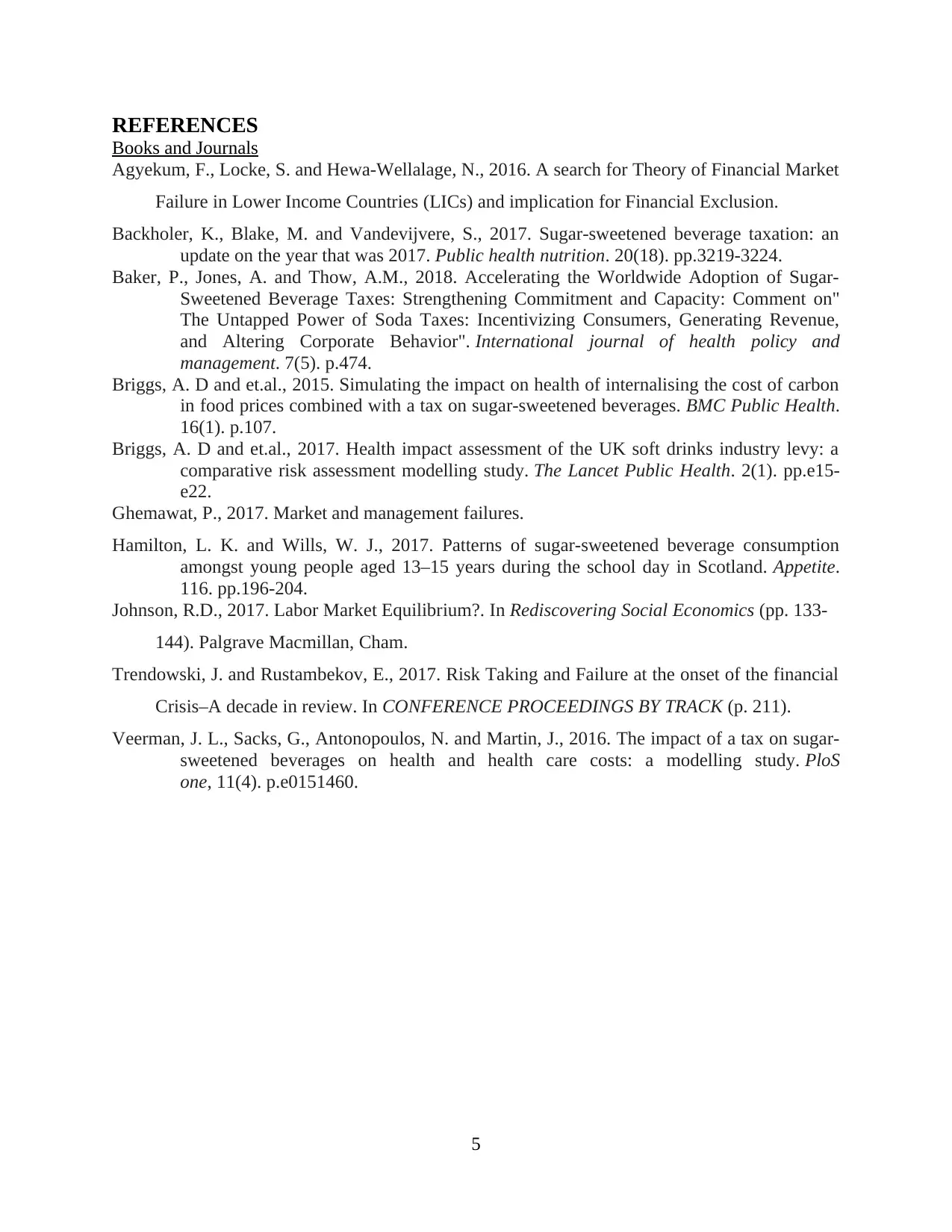
REFERENCES
Books and Journals
Agyekum, F., Locke, S. and Hewa-Wellalage, N., 2016. A search for Theory of Financial Market
Failure in Lower Income Countries (LICs) and implication for Financial Exclusion.
Backholer, K., Blake, M. and Vandevijvere, S., 2017. Sugar-sweetened beverage taxation: an
update on the year that was 2017. Public health nutrition. 20(18). pp.3219-3224.
Baker, P., Jones, A. and Thow, A.M., 2018. Accelerating the Worldwide Adoption of Sugar-
Sweetened Beverage Taxes: Strengthening Commitment and Capacity: Comment on"
The Untapped Power of Soda Taxes: Incentivizing Consumers, Generating Revenue,
and Altering Corporate Behavior". International journal of health policy and
management. 7(5). p.474.
Briggs, A. D and et.al., 2015. Simulating the impact on health of internalising the cost of carbon
in food prices combined with a tax on sugar-sweetened beverages. BMC Public Health.
16(1). p.107.
Briggs, A. D and et.al., 2017. Health impact assessment of the UK soft drinks industry levy: a
comparative risk assessment modelling study. The Lancet Public Health. 2(1). pp.e15-
e22.
Ghemawat, P., 2017. Market and management failures.
Hamilton, L. K. and Wills, W. J., 2017. Patterns of sugar-sweetened beverage consumption
amongst young people aged 13–15 years during the school day in Scotland. Appetite.
116. pp.196-204.
Johnson, R.D., 2017. Labor Market Equilibrium?. In Rediscovering Social Economics (pp. 133-
144). Palgrave Macmillan, Cham.
Trendowski, J. and Rustambekov, E., 2017. Risk Taking and Failure at the onset of the financial
Crisis–A decade in review. In CONFERENCE PROCEEDINGS BY TRACK (p. 211).
Veerman, J. L., Sacks, G., Antonopoulos, N. and Martin, J., 2016. The impact of a tax on sugar-
sweetened beverages on health and health care costs: a modelling study. PloS
one, 11(4). p.e0151460.
5
Books and Journals
Agyekum, F., Locke, S. and Hewa-Wellalage, N., 2016. A search for Theory of Financial Market
Failure in Lower Income Countries (LICs) and implication for Financial Exclusion.
Backholer, K., Blake, M. and Vandevijvere, S., 2017. Sugar-sweetened beverage taxation: an
update on the year that was 2017. Public health nutrition. 20(18). pp.3219-3224.
Baker, P., Jones, A. and Thow, A.M., 2018. Accelerating the Worldwide Adoption of Sugar-
Sweetened Beverage Taxes: Strengthening Commitment and Capacity: Comment on"
The Untapped Power of Soda Taxes: Incentivizing Consumers, Generating Revenue,
and Altering Corporate Behavior". International journal of health policy and
management. 7(5). p.474.
Briggs, A. D and et.al., 2015. Simulating the impact on health of internalising the cost of carbon
in food prices combined with a tax on sugar-sweetened beverages. BMC Public Health.
16(1). p.107.
Briggs, A. D and et.al., 2017. Health impact assessment of the UK soft drinks industry levy: a
comparative risk assessment modelling study. The Lancet Public Health. 2(1). pp.e15-
e22.
Ghemawat, P., 2017. Market and management failures.
Hamilton, L. K. and Wills, W. J., 2017. Patterns of sugar-sweetened beverage consumption
amongst young people aged 13–15 years during the school day in Scotland. Appetite.
116. pp.196-204.
Johnson, R.D., 2017. Labor Market Equilibrium?. In Rediscovering Social Economics (pp. 133-
144). Palgrave Macmillan, Cham.
Trendowski, J. and Rustambekov, E., 2017. Risk Taking and Failure at the onset of the financial
Crisis–A decade in review. In CONFERENCE PROCEEDINGS BY TRACK (p. 211).
Veerman, J. L., Sacks, G., Antonopoulos, N. and Martin, J., 2016. The impact of a tax on sugar-
sweetened beverages on health and health care costs: a modelling study. PloS
one, 11(4). p.e0151460.
5
1 out of 7
Related Documents
Your All-in-One AI-Powered Toolkit for Academic Success.
+13062052269
info@desklib.com
Available 24*7 on WhatsApp / Email
![[object Object]](/_next/static/media/star-bottom.7253800d.svg)
Unlock your academic potential
Copyright © 2020–2026 A2Z Services. All Rights Reserved. Developed and managed by ZUCOL.


